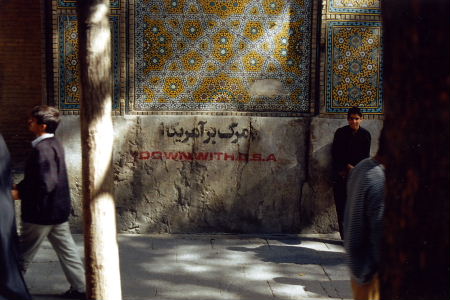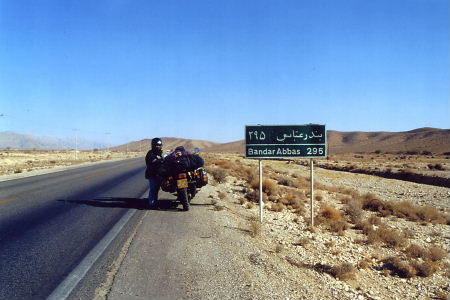Iran-Hospitable not Hostile-October 2001
Hospitable not HostileMoney changers came at us from all angles, offering what they said was the
best exchange rate. It is not, it is far better changing money into Iranian
Rials once through customs on the other side of the border, were better
rates are on offer. With no black market to speak of now it is easy to get
money changed and the only thing the Iranians like about the US is its
dollar! Iranian customs was easy. Nobody wanted to check any baggage only
the Carnet de Passage against the chassis number. It took about an hour and
everyone said we were very welcome in Iran and hoped we enjoyed our stay.
Through Eastern Turkey, many overlanders we met went through Syria and
Jordan and were shipping to India. We were the only ones that we knew off
at that time going through Iran. Wendy had to wear a headscarf at all time
in public. A bit awkward on the bike but she soon got quite used to it!The northwest of Iran was cold of a night but warm of a day. Every time we
stopped we were surrounded by crowds of people all gathering to see us on
the bike. Iran does not have any motorbikes over 200cc so we were a rare
sight to some people. Once they knew what we were doing pen and paper were
given to us to sign autographs. Gasps, ooooh's and aaaah's could be heard
from the crowd as we ran through our route so far and the intended route
ahead. As our original plan was to go through Pakistan when the crowds
heard this they gestured a gun and said "Bin Laden very dangerous".

ANTI AMERICAN GRAFFITI
Some people asked if we were American, we were quick to point out that we
weren't, not knowing the response from the crowd. We would often find "Down
with the USA" sprayed on walls and building. Saying we were English did not
seem like a good idea either, so all across Iran we became Scottish. This
proved a good answer to an awkward question, 90% of people did not know
where Scotland was and therefore did not know if Scotland was taking part
in the war with Afghanistan. We covered our Union Jack badge on the bike
with a souvenir touring sticker so as not to attract attention across the
Middle East but not once did we feel threatened.
People we not afraid of asking personal questions, their favourites being
"How old are you?", "Are you married?", "How much do you earn?", "How much
is the bike worth?" and "Do you have children, if not why not?" (especially
after hearing we had been married for 12 years!). Some people said "rich
man" when they asked about my occupation back home and I told them I was a
Goldsmith. They would say "you must be rich, you are a westerner". We were
told many times through Turkey and Iran that it would take the average
person 10 years of working and saving all their wages to by a bike like
ours. Many times when buying food people would get offended when we tried
to pay saying "You guest in my country, it is free". Religion and politics
were subjects we tried to stay off as we did not want to discuss them with
fear of offending, but sometimes they insisted and seemed well aware that
everybodys' views are different so were keen to hear what we thought with
great interest.The Iranians were the friendliest and most helpful people we
had met on the trip so far. Muslim hospitality is unsurpassed.
Heading south east through Iran it took us through some fantastic places,
Qazvin, Kashan, Esfahan and Shiraz. They had the most amazing mosques with
fantastic mosaic tile work and architecture.
It was not uncommon to find five people on a motorbike in Iran! You had to
keep your wits about you while out on the roads as Iranian driving is not
the best in the world (even if the people were!). It had to be seen to be
believed, its appalling! They would drive very close to you to get a good
look at the bike. They do not stop at traffic lights, drive in the dark
with no headlights on and drive around roundabouts and up roads the wrong
way.

ROAD TO BANDAR E ABBAS
We headed to Bandar e Abbas, in Southern Iran and got a boat across the
Gulf to Dubai. The boat looked more like a survey ship and had a dozen
vehicles on board, our motorbike and 20 passengers. The crossing was 12
hours. After 10 hours the alarm bells rang and the lifeboat and some of the
crew were put to sea. A dhow, which is a traditional wooden boat in the
Middle East and Asia, was sinking and just about to go under. The crew of
the stricken vessel were standing on the roof of the wheel house with
sharks circling all around. They were brought onto our ship were we heard
the Capitan say the dhow had been hit by a naval ship who hadn't seen them
and carried on.
